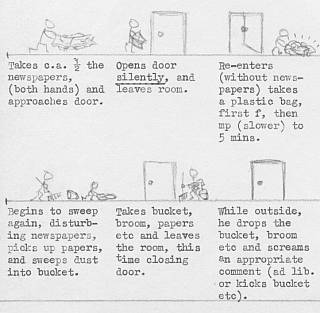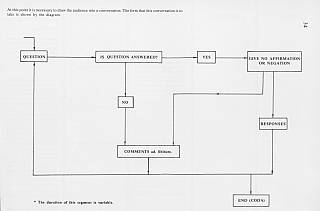
|
 |
Politics and the composer's practice
From a talk given at the Institute for Postcolonial studies in North Melbourne, 15.3.07 as part of the Politics and Performance series.
Rainer Linz
There are many facets of a composer's practice that can be called political. In my own case I would mention collaboration, and the habit of "building" an audience into a work. I will say some more about this later on, but my main intention tonight is to "come out of the closet" as it were, and talk about some of my pieces that are based on political subjects; that is to say, pieces which refer to government or to public administration.If I have defined the "politics" in this lecture series title rather narrowly, then I will take a much broader view of the "performance", to include the process of composition.
I use the closet phrase wryly because in some circles there is still a degree of stigma attached to music that is taken to be overtly political. The advice I received many times as a student, and since, was: "dont get political" - "dont get involved with politics." When I asked why I shouldn't get involved with politics as a composer, I was told something to the effect that political circumstances can change, and music which is based on them risks becoming irrelevant. I suspect there is more to it than that but on the surface, this is not a bad argument.
Yet if some things change, its true that others never do, at least not in this brief moment of time that we call civilisation. I thought immediately of Beethoven's 3rd Symphony, which was originally to have been dedicated to Napoleon Bonaparte. When Beethoven was told that Bonaparte had crowned himself Emperor, he reportedly tore the dedication page from the score, and scratched out Bonaparte's name with such force that it tore a hole in the manuscript paper. That was about 200 years ago.
This political act, though external to the Symphony links Beethoven's devotion and later disappointment with Bonaparte to the music. In my view, the incident helps us to understand the symphony, and perhaps even helps us to understand Bonaparte.
More than a quarter of a century earlier, in Haydn's "Farewell" Symphony No 43, we see a political manouevre built right into the last movement. Today we would call it an Industrial Relations issue.
Haydn's employer Prince Niclaus was apt to spend more and more time at his country estate, taking his musicians with him, and away from their families for ever longer periods of time. In the last movement of Haydn's Farewell Symphony, two by two, the musicians in the orchestra stand up and leave the room, with the result that only a handful are left by the time the symphony ends. For the prince the implication was clear: it's time to go home.
Erik Satie's ballet Relache, written in 1924 was only the latest in a long line of French Musical scandals. The word Relache has a special meaning in the french theatre, that is, to rest or pause. It means the theatre is closed. So after what is described as a major bout of pre-publicity, the opening night audience for Satie's Relache arrived to find that the theatre was indeed dark, and the doors were closed.
Can we forget that Wagner was exiled from Germany under fear of arrest for his part in the Year of Revolutions in 1848; or that Plato, in his Republic, warns us that music is potentially dangerous to the State and should be subjugated and controlled?
Even with this five-stop Cook's Tour of the popular classics, there's plenty of politics. A number of themes emerge: there's the theme of protest. There's a theme on the use of text, which in these cases does not involve any "setting to music" or songwriting, but rather provides meaning through some process of titling.
One has a sense of animation, of changing circumstances and of things underfoot.
There is also what I call a certain materiality, or a physical tangibility that is created by the works. Prince Niclaus knew that he, himself, had a part to play in Haydn's political pantomime. "If they're all going," he reportedly said, "we may as well go too."
It was the same for the audience at the premiere of Satie's Relache. They could feel the cold air of the street directly on their faces. In such ways music, which is the most abstract of the arts, can overstep the boundaries of the abstract and quite literally hit us in the face.
It is this tangibility, or materiality that I want to address first in relation to my own work tonight, and try to explain what I meant earlier about building an audience into a work. First I will look at some pieces in the Theatre Book from 1977, then the stage work Apparitions, The Opera "Crossed Purposes" for radio and finally two pieces from Probity Quiz, also for radio.